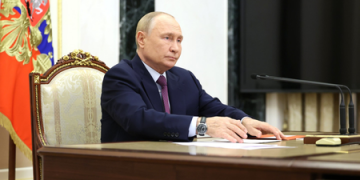Agencies
Beirut, May 6: A deal hammered out by Russia, Turkey and Iran to set up ‘de-escalation zones’ in mostly opposition-held parts of Syria went into effect Saturday.
The plan is the latest international attempt to reduce violence in the war-ravaged country, and is the first to envisage armed foreign monitors on the ground in Syria.
The United States is not party to the agreement and the Syrian rivals have not signed on to the deal. The armed opposition, instead, was highly critical of the proposal, saying it lacks legitimacy.
The details of the plan will be worked out over the next several weeks. There were limited reports of bombing in northern Homs and Hama, two areas expected to be part of the ‘de-escalation zones,’ activists said. There were no immediate reports of casualties.
It is not clear how the cease-fire or ‘de-escalation zones’ will be enforced in areas still to be determined in maps to emerge a month from now.
The Syrian Observatory for Human Rights said there had been a reduction in fighting across Syria since the deal came into force, but warned it was too early to say whether it would last.
A rebel commander said the general level of violence was reduced, but added: “Regime attempts (to advance) in the Hama countryside continue.”
With the help of Russia and Iranian-backed militias, the Syrian government has gained the military upper hand in the six-year conflict. The wide array of rebel groups include some supported by Turkey, the United States and Gulf monarchies. Russian officials said it will be at least another month until the details are worked out and the safe areas established.
In the tangled mess that constitutes Syria’s battlefields, there is much that can go wrong with the plan, agreed on in talks Thursday in Kazakhstan.
Syrian, Russian, Turkish and US-led coalition aircraft operate in different, sometimes same areas in Syria. It is not yet clear how the new plan would affect flightpaths of US-led coalition warplanes battling Islamic State militants and other radical groups and whether the American air force would abide by a diminished air space.
Russia and Iran, two of the plan’s three sponsors, are key allies of President Bashar Assad’s government and both are viewed as foreign occupation forces by his opponents. Rebels fighting to topple Assad are enraged by Iran’s role in the deal and blame the Shiite power for fueling the sectarian nature of Syria’s conflict, now in its seventh year.
Turkey, the third sponsor, is a major backer of opposition factions and has also sent troops into northern Syria, drawing the ire of Assad and his government.







































